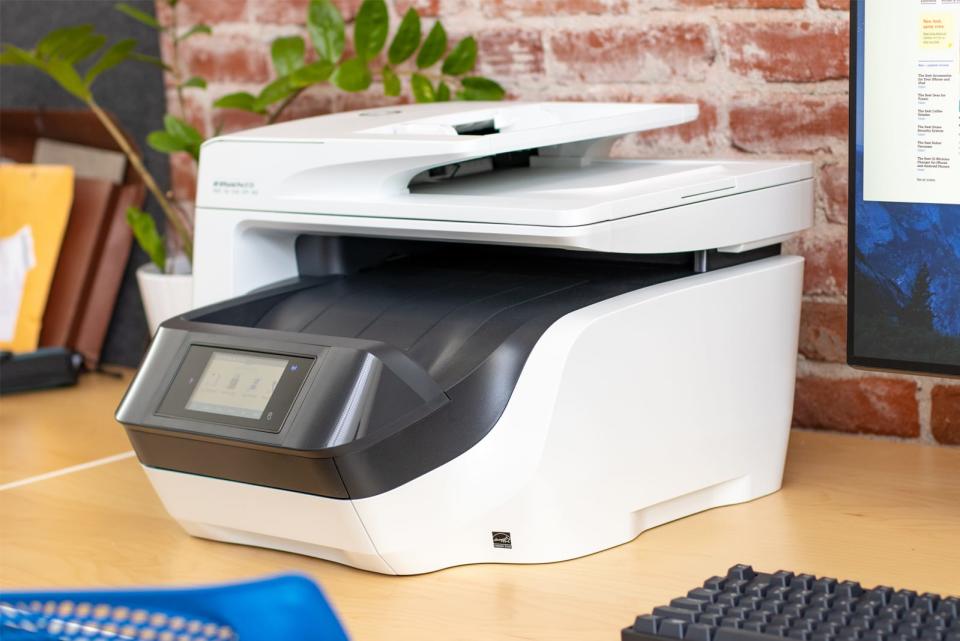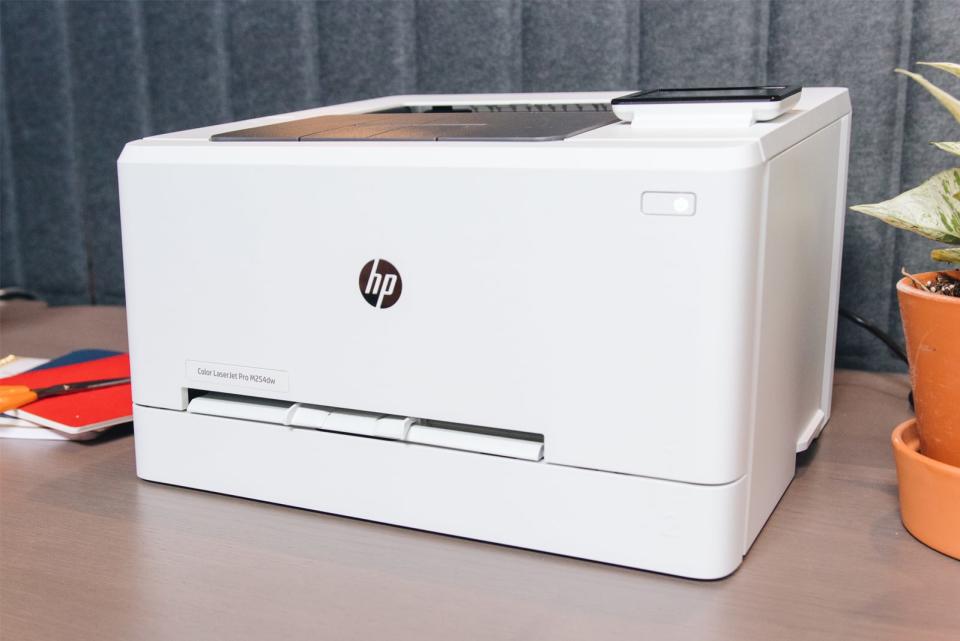The best home printers
With picks from HP, Brother and Epson.
By Ben Keough
This post was done in partnership with Wirecutter. When readers choose to buy Wirecutter's independently chosen editorial picks, Wirecutter and Engadget may earn affiliate commission. Read the full guide to home printers here.
From the very beginning of Wirecutter's existence, we've been testing printers. In total, we've spent nearly 500 hours researching hundreds of inkjet and laser printers, and testing dozens of them. The reliable, simple-to-operate HP OfficeJet Pro 8720, an all-in-one color inkjet, is a good choice for most people who need to print regularly at home. It delivers high-quality prints from any device you use, can scan and copy, and is just better designed ergonomically than the competition. We've also got recommendations for the best, least frustrating printers you can buy, whether you print every now and then or every day, run a home business, need to print projects for school-age kids, or even if you're a photographer who wants to print high-quality images at home.
The best all-around home printer: Inkjet all-in-one
Who this is for: Families—particularly those with school-age kids—or anyone who needs a machine that can reliably do it all.
Why we like it: HP's OfficeJet Pro 8720 is one of the least annoying printers we've ever used, thanks to its straightforward setup, reliable Wi-Fi, smooth touchscreen interface, and well-designed software. It can print from pretty much any device you can think of, because it works with Windows, MacOS, Linux, ChromeOS, iOS, and Android. In our testing for the best all-in-one printer, we found that this model delivers great-looking color prints and sharp text. Because it's an all-in-one machine, it can print, scan, and copy two-sided, and does so at a rapid clip. It will even send faxes, if that's still something you need to do.
The HP's up-front cost is reasonable for this sort of machine, and operating costs are low: under 2¢ per page for black-and-white and under 10¢ per page for color. This model can also take advantage of HP's unique Instant Ink program, which is a great option if you print a lot of full-color pages or glossy photos. We also love the 8720 model's design; its recessed output tray, which keeps your printed pages from getting knocked to the floor, is a stroke of ergonomic genius.

Flaws but not dealbreakers: Because it's an inkjet printer, the 8720 can clog if it's left unused for too long, so an inkjet may not be best for you if you don't print often. (Fixing a clog requires wasteful cycles that deplete your ink tanks.) Laser printers don't have this issue, but a laser all-in-one that can print in color costs about twice as much up front. The 8720 is also not the most versatile machine when it comes to handling nonstandard printing media. For example, you have to take out your letter paper and adjust the guides each time you want to print on envelopes or labels, because this printer has neither a secondary paper tray nor a bypass slot—features common to more professional (and more expensive) machines. Last, the front USB port is convenient for printing photos and saving scans, but won't let you print PDFs or Word files; to get that capability, you need to upgrade to a more expensive model.
Dimensions: 19.7 by 20.9 by 13.4 inches
Weight: 33.02 pounds
Pages per minute (stated, monochrome/color): 24/20
Cost per page (monochrome/color): 1.9¢/9.7¢
Learn more in our full guide to the best all-in-one printer.
A home office powerhouse: Color laser printer
Who this is for: Home- and small-business owners, or people who simply don't want to deal with the clogs that can plague inkjets.
Why we like it: The HP Color LaserJet Pro M254dw is our pick for the best laser printer because it's easy to use, produces brilliant results, and enjoys laser printing technology's superior reliability. No matter how long you leave it sitting unused, you can turn it on and it'll start printing more or less right away—and without wasting any toner on cleaning cycles. Though it's more expensive than a comparable monochrome laser printer, it's also far more flexible. In addition to crisp text, it produces vivid color graphics and can even turn out respectable photos (just not on photo paper). Print speeds are quick, and per-page costs are reasonable. This model's smartphone-style color touchscreen makes changing settings simple, and HP's PC and mobile software is the best in the business. Unlike most other printers, the M254dw can connect to 5 GHz wireless, which should speed up big print jobs and helps ensure that the printer won't lose connection over time.

Flaws but not dealbreakers: The M254dw can take a minute or two to get going for very large print jobs. We saw this issue only once during testing, but several owners have reported it in reviews. Because this printer comes with a skimpy set of "starter" toner that's good for only 800 black-and-white and 700 color pages, you'll probably need to buy replacements within a year or so of purchase. Getting cartridges with the highest possible capacity makes the best financial sense, but a full set for this machine will cost around $400, or nearly twice as much as the machine itself. Thanks to all that toner, this printer is big (long, in particular) and heavy; make sure you have a space that can accommodate it. And, of course, the M254dw is just a printer—it doesn't include copy, scan, or fax capability. To get those features, you'll need to upgrade to a model like our color laser all-in-one pick.
Dimensions: 15.4 by 18.7 by 11.7 inches
Weight: 32.6 pounds
Pages per minute (stated, monochrome/color): 22/22
Cost per page (monochrome/color): 3¢/15¢
Learn more in our full guide to the best laser printer.
Affordable and reliable: Monochrome laser printer
Who this is for: People who don't need a printer on a daily basis, but still appreciate having one for the few times a year when they need to print.
Why we like it: The Brother HL-L2350DW is simple, fast, dependable, easy to set up, and affordable to operate. And because it's a laser printer, it can sit for weeks or months between print jobs and start up again without trouble. But although it's a budget model, it's not short on features. For the $100-ish asking price, you get automatic duplex printing capability, a large 250-sheet paper tray, reliable Wi-Fi connectivity, and the option to use high-yield toner cartridges—which means you don't have to buy them very often. This printer works with Windows, MacOS, Linux, ChromeOS, iOS, and Android. As for print quality, in our testing to choose the best laser printer, we found that this model is more than good enough for any text-based document, but it might need a few settings tweaks to produce a graphics-heavy document you'd want to hand out to other people. It's also extremely compact, which means it can fit in tight spaces (like a bookcase shelf) where other printers can't go.

Flaws but not dealbreakers: It's a little flimsy and the packaging isn't great, so if you buy one, be sure to check for any plastic parts that might have gotten bumped out of place in transit. We don't recommend printing via Brother's iPrint&Scan software, because it results in excessive, detail-destroying contrast. And if you use a Chromebook, you should be aware that the printer's default settings might prevent it from working with Google Cloud Print; to get it working, you need to disable IPv6 in the Networking section of the printer's Web control panel.
Dimensions: 14.0 by 7.2 by 14.2 inches
Weight: 15.9 pounds
Pages per minute (stated): 32
Cost per page: 3.3¢
Learn more in our full guide to the best laser printer.
Gallery-worthy prints at home: Photo printer
Who this is for: Serious photographers, or those who aspire to be.
Why we like it: The Epson SureColor P600 is capable of delivering gallery-quality prints up to 13 inches wide, and can print panoramas up to 10 feet long. It can also print on a huge variety of media, including metal and CDs. Though its color photos caught our eye while testing for the best photo printer, we especially loved the black-and-white output; it's as close as you can get to traditional darkroom prints at home. Those prints will last you a long time, too: the P600's UltraChrome HD pigment ink is one of the longest-lasting consumer inks. The touchscreen interface is a cut above what you'd get from most rivals. Ink costs are reasonable, and you can get extra-large-capacity tanks, so you'll need to fill up less often. In addition to Wi-Fi, this printer has USB and Ethernet connections for faster printing.

Flaws but not dealbreakers: As with most photo printers, print speeds are glacial—a standard 8-by-10-inch photo takes more than 3 minutes to print, and that time balloons to almost 6 minutes over Wi-Fi. This printer wastes ink when switching between matte and photo black inks (about 3 mL each time), because they share the same ink line to the print head. And if you use paper other than Epson's own, you'll have to seek out the appropriate media settings and ICC color profiles; frustratingly, Epson doesn't include them.
Dimensions: 24.2 by 32 by 16.7 inches
Weight: 33.07 pounds
Cost per mL of ink: $1.24
Learn more in our full guide to the best photo printer.
This guide may have been updated by Wirecutter. To see the current recommendation, please go here.
When readers choose to buy Wirecutter's independently chosen editorial picks, Wirecutter and Engadget may earn affiliate commissions.
